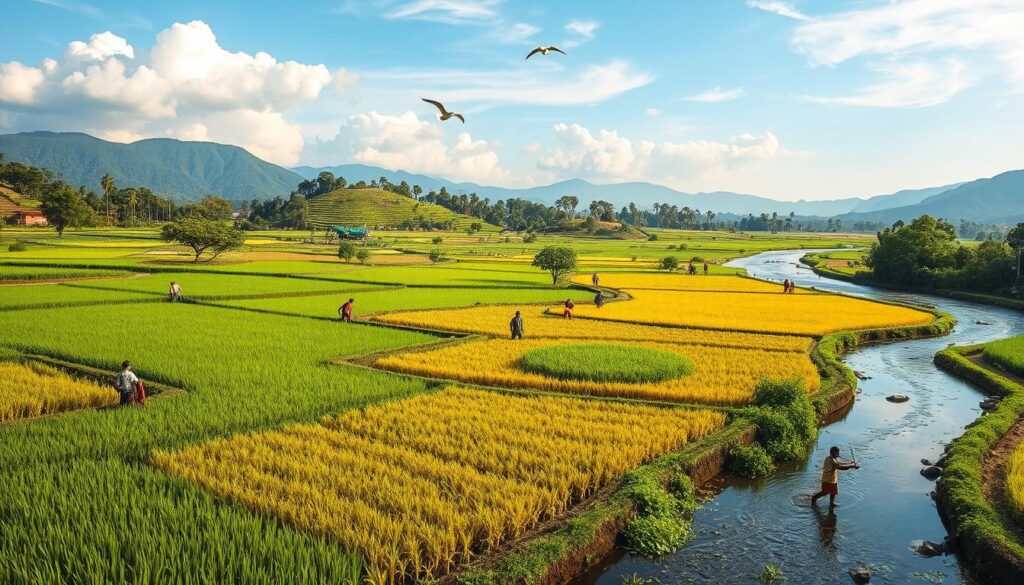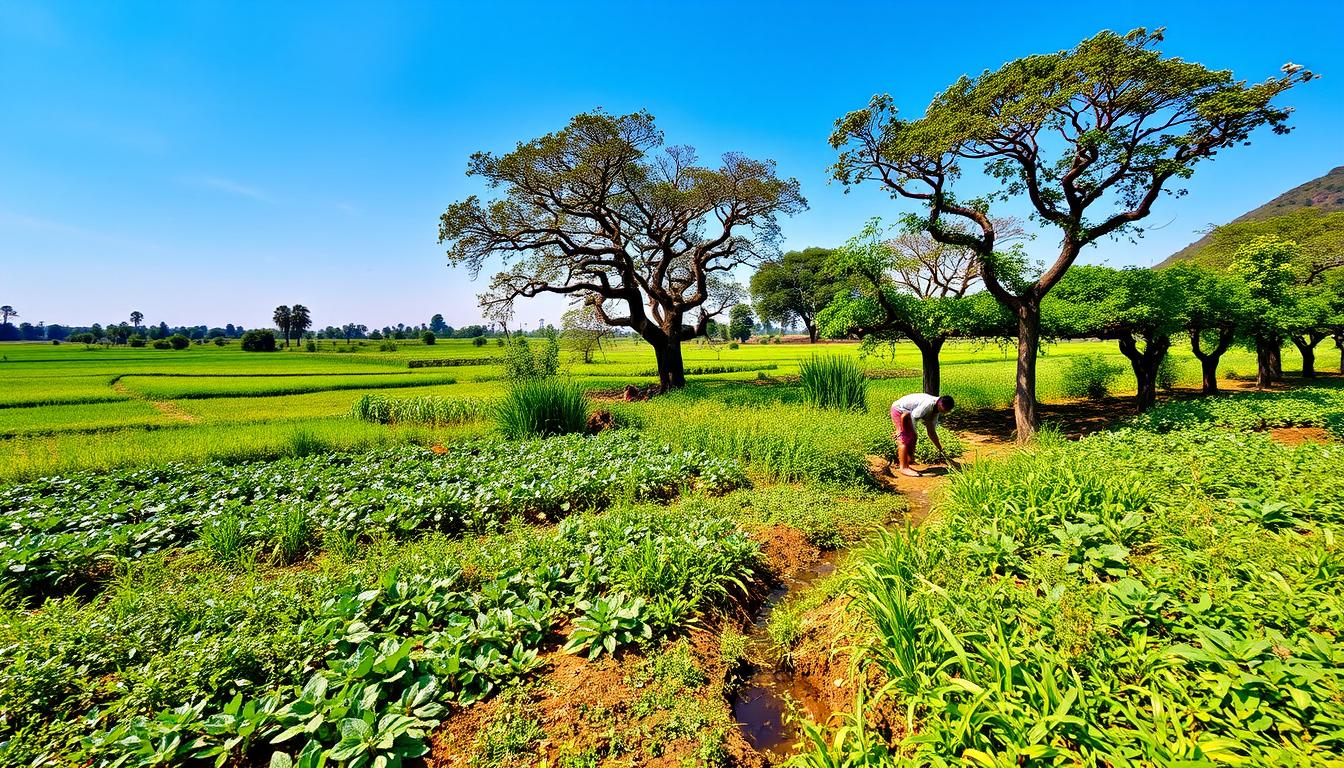Recently, a study showed that over 2.8 million Indian farmers have started using organic farming. This has led to a 17.2% increase in organic land in just one year. This big change could make India a top player in growing food in an eco-friendly way.
India is working hard to feed its people and protect the environment at the same time. Organic farming is key to this effort. This article will look at what organic farming is, how it differs from old ways, and why it’s in demand. By understanding these points, we can work towards a future where food, nature, and wealth go hand in hand.
Key Takeaways
- Organic farming in India is experiencing a remarkable surge, with a 17.2% increase in organic agricultural land in the past year.
- Organic farming principles offer a sustainable solution to India’s agricultural challenges, balancing food production and environmental preservation.
- The article explores the core components of organic agriculture, the evolution from traditional to modern practices, and the current market demand and growth trends.
- Understanding the benefits of sustainable agriculture in the Indian context is crucial for shaping a future where food security, environmental protection, and economic prosperity coexist.
- The article provides a comprehensive overview of the role of organic farming principles and its scope in India’s agricultural future.
Understanding Organic Farming Principles and Its Scope in India
Organic farming is a way to grow food that focuses on keeping nature balanced. In India, more people are turning to organic farming to solve problems with regular farming. This approach helps the environment and promotes healthy food.
Core Components of Organic Agriculture
Organic farming puts a lot of emphasis on soil health and keeping a variety of life forms. Farmers avoid using harmful chemicals and instead use natural ways to make the soil better. They add compost and crop leftovers to the soil to make it richer and hold more water.

They also grow many different crops and keep natural areas to support a healthy ecosystem.
Traditional vs. Modern Organic Practices
India has a long history of organic farming, with many communities using old methods. These methods include changing crops often, using animals, and growing local plants. But, new, modern organic farming methods are also becoming popular.
These newer methods use science and technology to make farming more productive and efficient.
Current Market Demand and Growth
In India, more people want to buy organic food because they know it’s better for their health and the planet. The market for organic food is growing fast, expected to hit $2.5 billion by 2025. This growth is good for farmers but also brings challenges as they try to meet the demand.
| Organic Farming Principles | Traditional Practices | Modern Practices |
|---|---|---|
| Soil Health | Crop Rotation, Manure Application | Composting, Green Manure, Biochar |
| Biodiversity | Polyculture, Intercropping | Agroforestry, Habitat Conservation |
| Pest Management | Biological Control, Botanical Pesticides | Integrated Pest Management, Beneficial Insects |
“Organic farming is not just about food production; it’s about rebuilding ecosystems, strengthening communities, and creating a more sustainable future.”
Benefits of Sustainable Agriculture in Indian Context
Sustainable agriculture can change India’s farming for the better. It’s a way to grow food that’s good for the planet and helps local people. With food security and soil conservation being big issues, sustainable agriculture seems like a great answer.
One big plus of sustainable farming is it helps ensure everyone has enough to eat. It does this by using different crops, organic methods, and using resources wisely. This way, even when the weather and environment get tough, we can still get the food we need.
- Diverse crops make farming more stable against pests, diseases, and weather changes. This keeps food coming and makes sure we get a variety of healthy foods.
- Organic farming, like using compost and natural fertilizers, makes the soil better. It keeps the soil fertile and holds onto water, making the land more productive over time.
- Smart water use, like collecting rainwater and using drip irrigation, helps save water. This is key when water is scarce and we need to use it wisely.
Sustainable farming is also key for keeping the soil healthy. This is vital for India’s environment. By using fewer chemicals and focusing on natural ways to improve the soil, farming can be more sustainable. This keeps the soil productive and strong for the future.
“Sustainable agriculture is not just about producing food; it’s about nurturing the land, empowering communities, and ensuring a brighter future for generations to come.” – Dr. Vandana Shiva, renowned Indian environmental activist and author.
Sustainable farming also helps people in rural areas and boosts the local economy. It supports small farmers, cooperatives, and local food systems. This creates jobs, reduces poverty, and builds strong, thriving communities.

As India faces the challenges of modern farming, turning to sustainable practices is a smart move. It tackles big problems while protecting people and the planet.
Key Organic Farming Methods and Implementation Strategies
India’s agricultural future depends on sustainable farming. Organic farming is key in this shift. It uses natural pest control and soil health management to grow food and protect our ecosystems.
Natural Pest Control and Integrated Pest Management
Organic farmers use integrated pest management (IPM) to fight pests without chemicals. They mix crop rotation, permaculture, and beneficial insects for a complete pest control system. This method helps manage pests and boosts biodiversity.
Soil Health Management Techniques
Soil health is vital for organic farming. Farmers use crop rotation, cover cropping, and composting to make soil rich. These methods improve soil fertility and help fight climate change.
Water Conservation Practices
Water is scarce in many Indian areas. Organic farming has solutions like rainwater harvesting and drip irrigation. These methods save water and make farming sustainable, even in dry areas.
| Organic Farming Method | Key Benefits |
|---|---|
| Integrated Pest Management | Reduces reliance on synthetic pesticides, promotes biodiversity, and creates a balanced ecosystem. |
| Crop Rotation | Enhances soil fertility, disrupts pest and disease cycles, and improves overall plant health. |
| Composting | Replenishes soil with organic matter, increases nutrient availability, and improves soil structure. |
| Water Conservation Practices | Minimize water usage, reduce runoff, and ensure the long-term sustainability of organic agriculture. |
Indian farmers can make their land more productive and resilient by using organic farming. As demand for organic food grows, these methods are key to a greener and more prosperous future for Indian farming.

Challenges and Opportunities in India’s Organic Sector
India’s organic farming sector has many challenges, but these also offer chances for growth. The organic certification process is complex and can be hard for small farmers. Limited market access and poor infrastructure also hinder organic farming adoption.
Despite these hurdles, the demand for organic products in India is growing fast. More people want organic food, thanks to health awareness. India’s land and climate are perfect for a booming biodynamic farming sector.
- Streamlining the organic certification process to make it more accessible for small-scale farmers
- Improving market infrastructure and distribution channels to connect organic producers with consumers
- Providing financial and technical support to help farmers transition to sustainable farming practices
- Promoting public-private partnerships to invest in research and development for innovative organic solutions
- Raising awareness about the benefits of organic agriculture and its role in ensuring food security and environmental sustainability
By tackling these challenges and seizing opportunities, India can lead the organic farming movement. This will promote sustainable farming and meet the demand for quality, eco-friendly food.
Government Initiatives and Certification Standards
In India, the government is working hard to boost organic farming and ensure everyone has food. The organic certification process is key. It helps verify the real organic products.

Organic Certification Process
The Agricultural and Processed Food Products Export Development Authority (APEDA) oversees the organic certification in India. This process has several steps:
- Farmer registration and documentation
- Inspection and evaluation of farming practices
- Laboratory testing of soil and produce
- Issuance of organic certification upon compliance
Policy Framework and Support Systems
The government has set up a strong policy framework for the organic sector. It includes the National Programme for Organic Production (NPOP) and the Participatory Guarantee System (PGS). These systems offer guidelines, standards, and support to farmers and processors.
Financial Assistance Programs
The government also offers financial assistance programs to support organic farming. These include subsidies, interest-free loans, and market development help. The goal is to help farmers, improve food security, and increase organic certification nationwide.
| Government Initiative | Key Focus | Impact |
|---|---|---|
| National Programme for Organic Production (NPOP) | Establishing organic standards and certification | Facilitated the growth of the organic sector and enabled exports |
| Participatory Guarantee System (PGS) | Decentralized organic certification for small and marginal farmers | Increased organic certification and food security among smallholders |
| Financial Assistance Schemes | Subsidies, interest-free loans, and market development support | Improved access to resources and markets for organic farmers |
The Indian government’s efforts have been crucial for the organic sector’s growth. They promote food security and ensure organic certification is credible across the country.
Conclusion
Organic farming in India is full of promise for the future. It lets farmers work with nature, improving their crops’ quality and safety. This also helps the environment.
Organic farming brings many benefits. It makes soil healthier and saves water. It also cuts down on harmful chemicals. With more people wanting organic food and government support, India’s organic farming is set to grow a lot.
Looking ahead, organic farming is key for India’s farming. It empowers farmers and promotes green practices. This way, India can lead in eco-friendly farming and ensure food security and environmental health for years to come.
